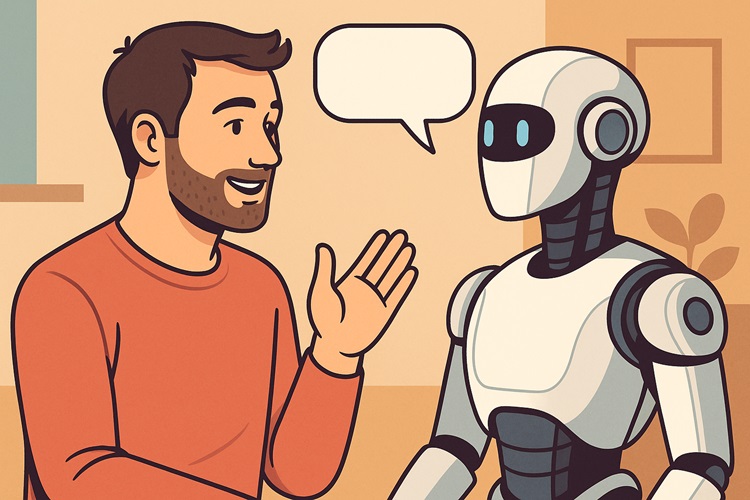How We’ll Talk to AI Tomorrow (& Why It Won’t Feel Weird)

How We’ll Talk to AI Tomorrow (& Why It Won’t Feel Weird)
From chatbots to co-workers- why AI might soon feel like just another person in the room
I remember the first time I used a voice assistant. I asked it to set a timer for pasta. It misheard me and played a jazz playlist instead. Not exactly helpful, but it was kind of fun.
Today, things are different.
Now I ask AI to summarize reports, clean up my writing, even brainstorm ideas, and it does a pretty decent job.
What happens next? How will humans interact with AI in the future, when it’s not just a tool but something closer to a collaborator?
Let’s keep it simple and walk through what that might look like.
Talking to AI Will Be Like Talking to People, not because AI will become human. It won’t.
The way we use it will feel more natural, less like typing into a search bar, more like a conversation.
You might speak out loud and get answers instantly, no typing.
You could wave your hand or raise an eyebrow to control something.
Maybe your AI knows your tone, your calendar, your mood and adapts to all of it.
The goal? You won’t need to learn how the tech works, It’ll just work the way you think. AI Will Be in the Room, Literally.
We won’t be stuck behind screens. AI could be part of your living room, your office, your car.
Imagine:
A virtual assistant that helps run your meetings and keeps track of tasks.
Smart glasses that quietly give you reminders while you talk to someone.
A personal AI that whispers tips in your ear during a job interview (subtle, not creepy).
Some of this already exists. The rest isn’t far off. We’ll Need to Learn New Social Rules.
Here’s the weird part: the more natural AI feels, the more we’ll need to adjust.
Do you say “thank you” to your AI?
Is it rude to ignore it?
Can an AI interrupt you?
These might sound silly, but we’ll figure it out, just like we figured out how to behave on Zoom calls or when texting emojis to our boss.
Your AI Will Know You (Like, Really Know You)
In the future, your AI might know:
How you like to start your mornings
Which projects stress you out
Who you trust at work
That’s useful but also… kind of personal.
So we’ll need to talk about trust, privacy, and what we’re okay with sharing. The line between helpful and invasive will matter more than ever.
What This means for You
You don’t need to become an AI expert but it helps to pay attention.
Start asking:
What do I want AI to help me with?
Where do I not want AI involved?
What skills do I still want to practice myself?
The future of AI isn’t about replacing humans, It’s about working with us. The better we understand that, the more we stay in control.
Final Thought
AI won’t feel like magic forever. That’s a good thing!
It’ll just be part of how we work, talk, learn, and solve problems, like spellcheck, email, or calendars.
Honestly, that future’s already knocking. Might as well open the door.
Deskgrid.ie – where we explore tech, design and the tools that shape how we work.
